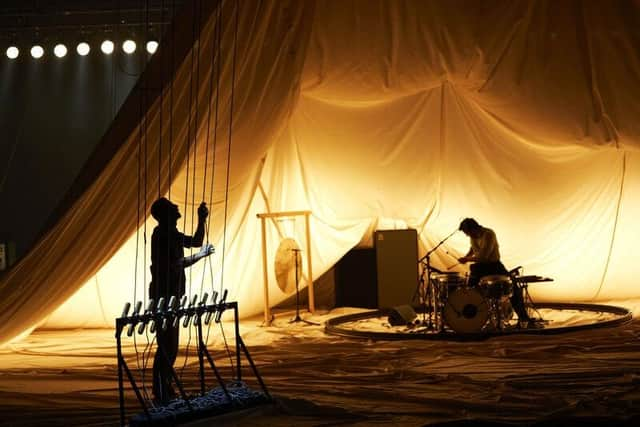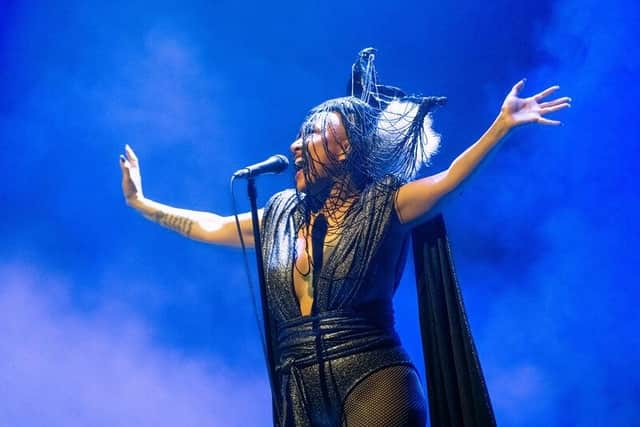EIF reviews: As Far As Impossible | Lady Blackbird | KBS Symphony Orchestra | The Magic Flute | Dunedin Consort
THEATRE
As Far As Impossible ****
Lyceum Theatre, until 14 August


In this second show of the Comedy De Geneve’s festival season, the country the characters call “Impossible” is not a state of mind, nor even an amalgam of all the war-torn and famine-blighted zones of the planet. It’s rather a real place in our world, inhabited by real people in desperate need of help; and like Theatre De Geneve’s first show Dusk, last weekend, Tiago Rodrigues powerful piece of documentary theatre As Far As Impossible looks unflinchingly at some of the most disturbing aspects of the relationship between comfortable western societies and the rest of the planet, this time through the real-life testimonies and stories of a group of long term aid workers, who call that country “impossible”, and refer to their own western homes as the land of the “possible”.
Their insights are therefore by turns surprising, heartbreaking, and deeply unsettling. The best they can do, they suggest, is to act as a temporary sticking-plaster on some of the worst horrors of a world that cannot be saved. They also recognise that those at home, no matter how often they ask, really do not want to know what it was like “out there”; and the fact that some aid workers abuse their position of power, or have no clue how to exercise it, is fully and even shockingly acknowledged.
Advertisement
Hide AdThe show’s content, in other words, offers little comfort. As a piece of theatre, though, As Far As Impossible benefits not only from a brave and powerful ensemble performance, but also from a superbly lit tented set, that rises and falls with the refugee camps and field hospitals in which the four characters work; and from a terrific percussion score by on-stage composer and musician Gabriel Ferrandini, that builds to a finale so complex, shattering and ominous that it somehow seems to capture the very essence of the troubling and sometimes terrifying stories we have heard.
Joyce McMillan


MUSIC
Lady Blackbird ****
Festival Theatre
This show, one of the most exciting of Edinburgh International Festival’s 2023 contemporary music programme, brought the world tour accompanying American jazz-soul singer Lady Blackbird’s breakthrough 2021 album to a close. It was clearly an emotional moment, not just for a rapt audience, but for the artist and her band. “I’m closing one of the most incredible chapters of my life,” she said, and there were group hugs and tears on stage at the end.
Before that, the audience had enjoyed a 90 minute exploration of one of the most intriguing recent late arrival careers in music. Dropped from a deal by Epic Records a decade ago, Marley Munroe’s long, self-driven reinvention as Lady Blackbird channels the Nina Simone song Blackbird, her first success in cover form. It was the opening song here, demonstrating the Simone-like depth and power of Munroe’s own voice against a measured, moody four-piece rock backdrop, which creditably resisted grandstanding, instead letting the star’s voice breathe.
She possesses star quality, all right, appearing in a dark gold leotard and cape, and feathered headdress; an outfit so elaborate that one of her bandmates had to retrieve her earpiece from it after the power finale of the smoky It’s Not That Easy. The songs built around the virtuoso precision of Kenneth Crouch’s piano playing helped illustrate the delicacy of her voice, but as the set moved on, the music became rockier.
A cover of the Beatles’ Come Together had raw energy, if an unusual vocal arrangement, while there was a poppier melody on recent song Feel It Comin’ and a stark feminist edge to Woman and moody break-up track It’ll Never Happen Again. As satisfying as this all was, the encore was something really special, a tribute to the Lady’s musical heroes which took in Gladys Knight’s Neither of Us (Wants to Be the Last to Say Goodbye) and a high-energy power through the late Tina Turner’s Proud Mary. It’s company she belongs in.
David Pollock
MUSIC
SCO: The Magic Flute ****
Usher Hall
It’s extraordinary to think of the creativity Mozart put into the final year of his life, not least the writing of two operas. One of these, The Magic Flute, is so full of life - its joy and misery, its rapture and profundity, its seriousness and its absurdities - it beggars belief it was the product of an ailing 36-year-old.
Advertisement
Hide AdTo hear it in this specially devised concert performance, spearheaded by conductor Maxim Emelyanychev and the Scottish Chamber Orchestra, was to witness select layers of its genius. With a newly-commissioned narrative from David Pountney threading a condensed storyline, this was a golden opportunity to focus on the fundamental theatricality of Mozart’s music.
German baritone Thomas Quasthoff wryly styled as Mozart’s co-creator/librettist Emanuel Schikaneder, and Scots actor Neil John Gibson playing a shadow duplicate of Papageno, jointly narrated. Given that Schikaneder created the original Papageno role, this fanciful partnership made sense, though what began as sharp and witty - amusing barbs and contemporary throw-ins - became more perfunctory as the opera progressed.
Advertisement
Hide AdMusically it rocketed. Emelyanychev was the centrifugal force, a seething ball of energy to which the orchestra and SCO Chorus responded with electrifying precision and joy de vivre. If we are to believe that Mozart threw himself heart and soul into his operatic projects, here was a tireless reincarnation. Emelyanychev saw fit to physically invade the territory of his agile cast, and made mischief with his capricious cascades on miniature keyboard glockenspiel.
Among the sung highlights were Ilker Arcayürek’s glowing Tamino, charismatic frolics from Gyula Orendt’s Papageno and Peter Hoare’s unsavoury Monostatos, Brindley Sherratt’s stoical Sarastro, Rachel Redmond’s gently responsive Papagena, and Kathryn Lewek’s ballistic coloratura as Queen of the Night. Julia Bullock’s Pamina, while charmingly reticent, was less consistent. The various cameo ensembles were an enriching presence.
Ken Walton
MUSIC
Dunedin Consort: Bach Orchestral Suites *****
Queen’s Hall
Bach’s four Orchestral Suites surely rank among the orchestral showpieces of their day, to the extent they can be classified as such. That they fitted into a single Queen’s Hall programme reflected their modest presence within the composer’s output. Mostly completed during his later Leipzig years, where church duties predominated, the requirement for such secular gems would not always have been a priority.
Yet they are undisputed gems, from the more intimately-scaled B minor and C major Suites, to two triumphant D major Suites equipped with enough full-blown Baroque armoury - triple trumpets, oboes and incendiary timps - to justify their positioning on Saturday as all-action bookends. The Dunedin Consort, with John Butt directing from the harpsichord, found distinctive character in each, without losing the overall impression that they collectively represent an intriguing genre snapshot.
The unrelenting magnetism of these performances stemmed from a tantalising fusion of refinement and exuberance; whether in the virtuosic intimacy of the B minor, where Katy Bircher’s mellow prominence on flute invoked a fragrant charm, or more generally the sheer dazzlement of the interweaving polyphony, its joyous impact, and Dunedin’s uncanny knack of making it all sound like a walk in the park.
Ken Walton
MUSIC
KBS Symphony Orchestra ****
Usher Hall, Edinburgh
A symphony really tests the mettle of an orchestra and the Korean Broadcasting System (KBS) and their conductor Pietari Inkinen certainly rose to the challenge in Tchaikovsky’s Symphony No 5 in E minor. From the opening bars with their distinctive dotted rhythms to the cascades of scale passages that bring this transformational journey from darkness into light to an end, the KBS gave a clean, crisp and focused account. But it was the outstanding star turns of the orchestra’s principals that stood out, particularly the gorgeous horn and clarinet solos in the slow movements. And setting the exacting pace was the superbly animated double bass section.
Advertisement
Hide AdHowever, the orchestra made heavy weather of Dvorak’s Cello Concerto in B minor which opened the concert. They were burdened by Inkinen’s overly slow tempi which flattened the phrasing and constrained the soloist, Jaemin Han, from fully unleashing his talent to explore his musical ideas. He has a phenomenal technique and produced a beautiful mellow singing tone which came into its own in the adagio. He seemed to prefer the smaller ensemble moments in this concerto which felt underpowered at times, lacking in musical architecture and an overall sense of dynamism and joyful giddiness.
Susan Nickalls